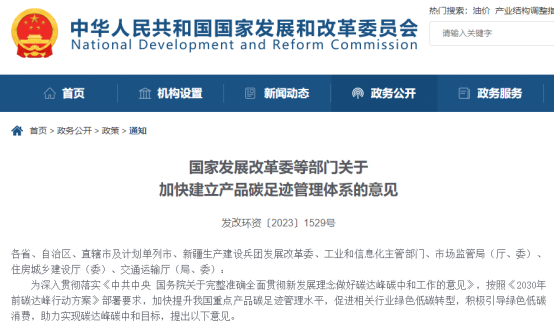
Development and Reform Commissions, Industry and Information Technology Departments, Market Regulation Bureaus (Departments, Commissions), Housing and Urban-Rural Development Departments (Commissions), and Transportation Departments (Bureaus, Commissions) of all provinces, autonomous regions, municipalities directly under the Central Government, cities with separate state planning, and the Xinjiang Production and Construction Corps:
To thoroughly implement the *Opinions of the Central Committee of the Communist Party of China and the State Council on Fully, Accurately and Comprehensively Implementing the New Development Concept and Doing a Good Job in Carbon Peak and Carbon Neutrality Work* and follow the deployment requirements of the *Action Plan for Carbon Dioxide Peaking Before 2030*, we aim to accelerate the improvement of China's management level of carbon footprints for key products, promote green and low-carbon transformation in related industries, actively guide green and low-carbon consumption, and help achieve the goals of carbon peak and carbon neutrality. The following opinions are put forward:
I. General Requirements
(1) Guiding Ideology
Guided by Xi Jinping Thought on Socialism with Chinese Characteristics for a New Era, we will fully implement the spirit of the 20th National Congress of the Communist Party of China, thoroughly apply Xi Jinping's economic thought and ecological civilization thought, fully, accurately and comprehensively implement the new development concept, accelerate the construction of a new development pattern, and strive to promote high-quality development. In accordance with the deployment of the Party Central Committee and the State Council on the major strategic decisions of carbon peak and carbon neutrality, we will promote the establishment of a product carbon footprint management system in line with China's national conditions and reality, improve the accounting methods, rules and standards system for carbon footprints of key products, establish a background database for product carbon footprints, advance the construction of a national product carbon label certification system, expand and enrich application scenarios, and give play to the role of the product carbon footprint management system in promoting the green and low-carbon transformation of production and lifestyle, so as to provide support for achieving carbon peak and carbon neutrality.
(2) Work Principles
- Systematic promotion, prioritizing urgent need: Focus on products with urgent market demand, significant emission reduction contributions, and obvious supply chain driving effects. In accordance with the principle of advancing batches as they mature and continuously improving, we will actively promote the construction of the product carbon footprint management system and steadily expand the scope of covered products.
- Innovation-driven, technology integration: Regard innovation as the key to improving carbon footprint management, strengthen original innovation, integrated innovation, and digestion, absorption and re-innovation of technical methods related to carbon footprint accounting and database construction, and guide the integration of carbon footprint management with big data, blockchain, the Internet of Things and other technologies.
- Government guidance, market leadership**: Establish and improve relevant laws, regulations, systems and management mechanisms for product carbon footprint management, strengthen basic capacity building, create a fair and orderly market environment, actively guide enterprises to carry out work related to product carbon footprint management on a voluntary basis, and support related industries to accelerate green and low-carbon transformation.
- Based on our own initiatives, open cooperation: Facing the goals of carbon peak and carbon neutrality, based on national conditions, reality and development stage, scientifically formulate relevant laws, policies and standards, establish a product carbon footprint management system with our own initiatives as the mainstay, actively participate in the formulation and revision of international carbon footprint-related standards and international metrological comparisons, fully absorb and learn from international useful experience, strengthen international exchanges and cooperation on product carbon footprints, and promote international mutual recognition.
(3) Main Goals
By 2025, about 50 key product carbon footprint accounting rules and standards will be issued at the national level; a number of carbon footprint background databases for key industries will be initially established; the national product carbon label certification system will be basically established; the application scenarios of carbon footprint accounting and labels in production, consumption, trade and financial fields will be significantly expanded; and carbon footprint accounting rules, standards and carbon labels for several key products will achieve international mutual recognition.
By 2030, about 200 key product carbon footprint accounting rules and standards will be issued at the national level; a number of carbon footprint background databases for key industries with wide coverage, high data quality and strong international influence will be basically established; the national product carbon label certification system will be fully established; carbon labels will be generally recognized by enterprises and consumers; carbon footprint accounting rules, standards and carbon labels for major products will be widely recognized internationally; and the product carbon footprint management system will provide strong guarantees for the comprehensive green transformation of economic and social development.
II. Key Tasks
(4) Formulate product carbon footprint accounting rules and standards
The State Administration for Market Regulation, together with the National Development and Reform Commission and other relevant departments, will accelerate the development of national standards for basic and general product carbon footprint accounting, specifying the accounting boundaries, accounting methods, data quality requirements and traceability requirements for product carbon footprints. The National Development and Reform Commission, in consultation with relevant departments, will determine the key products for which accounting rules and standards will be formulated first. Industry competent departments such as the Ministry of Industry and Information Technology, the Ministry of Housing and Urban-Rural Development, the Ministry of Transport, and the Ministry of Agriculture and Rural Affairs will organize relevant industry associations, leading enterprises, research institutes, etc., to study and formulate carbon footprint accounting rules and standards for key products in accordance with the principle of first trying with group standards and gradually transforming them into industry standards or national standards. Those with mature conditions may directly formulate national standards or industry standards. Industry competent departments, together with development and reform, market supervision and other departments, will issue a list of adopted rules and standards to provide unified and standardized rules and standards for enterprises and institutions.
(5) Strengthen the construction of carbon footprint background databases
On the basis of ensuring unified methods and accurate and reliable data, industry competent departments and qualified regions may establish carbon footprint background databases for relevant industries according to work needs to provide public services for enterprises to carry out product carbon footprint accounting. Relevant industry associations, enterprises and research institutions are encouraged to collect and sort out relevant data resources in their industries in accordance with laws and regulations, with clear indication of data sources, and release product carbon footprint background databases for subdivided industry fields. Industry competent departments shall strengthen guidance to relevant industry associations, enterprises and research institutions, standardize the construction of various databases, organize peer reviews, cross-validation and data traceability verification in a timely manner, and continuously improve data quality. On the premise of ensuring data security, international carbon footprint database suppliers are encouraged to cooperate with Chinese carbon footprint databases in accordance with market principles and update relevant background data based on facts.
(6) Establish a product carbon label certification system
On the basis of formulating product carbon footprint accounting rules and standards and establishing relevant background databases, a unified and standardized national product carbon label certification system will be established to guide enterprises in energy conservation and carbon reduction by clearly marking quantitative information on product carbon footprints. The National Development and Reform Commission and the State Administration for Market Regulation, together with the Ministry of Industry and Information Technology, the Ministry of Housing and Urban-Rural Development, the Ministry of Transport and other departments, will study and formulate measures for the administration of product carbon label certification, specifying the scope of application, label style, certification process, management requirements, etc., and orderly standardize and guide all regions and levels to explore and carry out work related to product carbon footprint management. Enterprises are encouraged to voluntarily carry out product carbon label certification in accordance with market principles, and guide them to mark and use carbon labels on products or their packages, advertisements, etc.
(7) Enrich product carbon footprint application scenarios
Give full play to the role of carbon footprint management in promoting the green and low-carbon transformation of enterprises, take the product carbon footprint level as an important indicator, promote enterprises to benchmark against domestic and international advanced levels, identify weak links in production and circulation, support enterprises to carry out process transformation, strengthen energy conservation and carbon reduction management, and tap the potential for energy conservation and carbon reduction. Leading enterprises are encouraged to establish product carbon footprint management systems according to industry development levels and their own realities, drive upstream and downstream enterprises to strengthen carbon footprint management, and promote the overall green and low-carbon transformation of the supply chain. Relevant requirements for carbon footprint management will be incorporated into government procurement demand standards in a timely manner, and the procurement of products with lower carbon footprints will be increased. Focusing on large consumer goods such as electronic products, household appliances and automobiles, we will steadily promote the application of carbon labels in the consumer goods field, guide shopping malls, e-commerce platforms and other enterprises to actively display commodity carbon labels, and encourage consumers to purchase and use products with lower carbon footprints. Support banks and other financial institutions to take carbon footprint accounting results as an important basis for adopting green financial products.
(8) Promote international alignment and mutual recognition of carbon footprints
Strengthen research on international carbon footprint methodologies, track the carbon footprint-related management systems, certification rules and implementation effects of international organizations and major economies, and orderly transform relevant international standards into national standards and industry standards in light of China's reality. Adhere to taking our own initiatives as the mainstay, give full play to the role of bilateral and multilateral dialogue mechanisms, strengthen communication and docking with relevant international parties, actively participate in the formulation and revision of international carbon footprint-related standards and rules, and promote alignment and mutual recognition with major trading partners in carbon footprint accounting rules and certification results. Industry associations, research institutions, enterprises and institutions are encouraged to actively participate in international activities and academic exchanges related to carbon footprints, and strengthen exchanges and cooperation with foreign parties in methodology research, technical specification formulation, professional talent training, etc.
III. Safeguard Measures
(9) Improve policy support
The National Development and Reform Commission, the Ministry of Industry and Information Technology, the Ministry of Housing and Urban-Rural Development, the Ministry of Transport, the Ministry of Agriculture and Rural Affairs, the Ministry of Finance, the State Administration for Market Regulation and other departments will strengthen research on carbon footprint accounting rules, standard development, and background database construction. Social capital is encouraged to invest in the construction of commercial carbon footprint background databases, and financial institutions are guided to gradually establish enterprise green and low-carbon level evaluation systems oriented by product carbon footprints.
(10) Strengthen capacity building
The National Development and Reform Commission, together with relevant departments, will establish an expert working group on product carbon footprint management to provide technical support for key tasks such as determining the annual list of key products, studying carbon footprint management mechanisms, and formulating measures for the administration of carbon label certification. Industry competent departments and all regions will organize training on carbon footprint management, publicize and interpret policy key points and management requirements, guide industry associations, backbone enterprises, institutions and social training institutions to play an active role, carry out standardized and orderly vocational training related to carbon footprints, and improve the professional competence of practitioners. Support service institutions for carbon footprint accounting, certification, management and consulting to strengthen their own capacity building and provide scientific, rigorous, systematic and standardized professional services for industry enterprises.
(11) Improve data quality
The State Administration for Market Regulation will guide relevant departments and units to strengthen the construction of a metrological guarantee system for carbon footprint data quality, and strengthen research and application of carbon metrology technologies. Industry competent departments and enterprises, in carbon footprint accounting and background database construction, shall give priority to data with metrological traceability, and conduct uncertainty analysis on accounting results and data. The use of 5G, big data, blockchain and other technologies in the construction of carbon footprint background databases is encouraged, and the role of the industrial Internet identification resolution system is brought into play to improve the reliability and timeliness of data monitoring, collection, storage, accounting and verification. Industry associations, research institutions and enterprises are supported to cooperate in multi-level and multi-dimensional data analysis and metrological comparison, and improve the data quality control system. Explore the implementation of a peer review system for carbon label certification, and strengthen mutual supervision among certification institutions. Strengthen industry management, introduce credit punishment and withdrawal mechanisms, explore the establishment of a "blacklist" system for certification institutions, and severely crack down on all kinds of fraud and false marking.
(12) Strengthen intellectual property protection
The State Intellectual Property Office is responsible for exploring and studying the intellectual property protection system in fields such as carbon footprint accounting methods and carbon footprint background databases, and cultivating and developing intellectual property dispute mediation organizations, arbitration institutions and notary institutions. Industry associations and chambers of commerce are encouraged to establish self-discipline and information communication mechanisms for intellectual property protection. Improve the review system for the foreign transfer of intellectual property rights, and manage the foreign transfer of carbon footprint-related technologies involving national security in accordance with the law.
IV. Organization and Implementation
(13) Strengthen overall coordination
The product carbon footprint management system covers a wide range, involves many industries and has a great social impact, so all regions and relevant departments must attach great importance to it. The National Development and Reform Commission will strengthen overall coordination of work, conduct in-depth research on major issues, determine annual work plans, strengthen daily work scheduling, solidly promote key tasks, and work with relevant departments to establish and improve China's product carbon footprint management system.
(14) Clarify job responsibilities
The Ministry of Industry and Information Technology, the Ministry of Housing and Urban-Rural Development, the Ministry of Transport, the Ministry of Agriculture and Rural Affairs, the State Administration for Market Regulation and other departments are responsible for formulating and promoting the implementation of carbon footprint accounting rules and standards for key products in relevant industries. The National Development and Reform Commission and the State Administration for Market Regulation, together with the Ministry of Industry and Information Technology, the Ministry of Housing and Urban-Rural Development, the Ministry of Transport and other departments, are responsible for work related to product carbon label certification. The National Development and Reform Commission, the Ministry of Industry and Information Technology, the State Administration for Market Regulation, the Ministry of Transport, and the Ministry of Commerce are responsible for tracking international carbon footprint dynamics and conducting coordination and docking with international organizations and major economies according to their responsibilities.
(15) Encourage pilot projects
Development and Reform Commissions of all regions shall work with relevant parties to promote work related to carbon footprint management in their regions. The Guangdong-Hong Kong-Macau Greater Bay Area shall actively promote the construction of product carbon footprint certification pilots and accelerate the formation of useful experience and institutional achievements. Qualified regions are encouraged to, according to their own realities, first carry out research on carbon footprint accounting rules and standard development for products not covered by the accounting rules and standards announced by the state, and those with mature conditions may be included in the national product carbon footprint management system in a timely manner. For relevant products for which the state has issued carbon footprint accounting rules and standards, all regions shall not issue or promptly abolish relevant local rules and standards.
National Development and Reform Commission
Ministry of Industry and Information Technology
State Administration for Market Regulation
Ministry of Housing and Urban-Rural Development
Ministry of Transport
November 13, 2023
Source: Official Website of the National Development and Reform Commission


